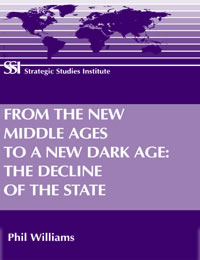Paul L. Williams
This is the third of three books that I am reviewing today and that I strongly recommend be read by every adult in America. The first two, in order of priority, are Mahmood Mamdani's
Good Muslim, Bad Muslim: America, the Cold War, and the Roots of Terror and CIA Anonymous Executive Analyst,
Imperial Hubris: Why the West Is Losing the War on Terror. I should add that terror is a tactic, not an enemy, it is impossible to win a war against a tactic.
What this book does is piece together all of the English-language reports over the past ten years or so regarding the probabilities and specifics of Bin Laden and Al Qaeda's having acquired several forms or portable nuclear devices. Although some reviewers have slammed this book for being fictional, they do not know what they are talking about. The FACTS are that the Soviet general officer responsible for the 100 suitcase nuclear bombs designed for Spetznatz use, some pre-positioned in the USA, has said publicly, in writing, and on more than one occasion that 66 of those are unaccounted for.
I took one star off for excessive reliance on two secondary sources, both excellent but never-the-less cited too often, and the commensurate lack of attention to foreign language materials that could have deepened this study considerably, especially when one takes into account the CIA executive analyst's comments in IMPERIAL HUBRIS regarding the straight truth-telling that can be found in Bin Laden's Arabic-language postings. “Nuclear hell storm” is out there (the author does cite this), and we had better take this more seriously than our government has.
The author opens with a notional “letter to America” from Bin Laden that is based on Bin Laden's actual statements (as itemized in IMPERIAL HUBRIS) and is alone worth the price of the book. If we don't take a long hard look at ourselves and correct the misbehavior that is radicalizing over a billion Muslims, we will not (not!) win this war.
The author does a really fine job, not just of amassing and stringing together a coherent story of Bin Laden's likely possession of nuclear capabilities, but also of showing the inter-relationship between the Afghanistan drug fields that the U.S. Government has stupidly allowed to flourish, the Pakistani production facilities that take the opium to a “Number 4” level of quality, and criminal organizations as well as corrupt governments everywhere that facilitate Bin Laden's operations. The roles of Russia, Iran, North Korea, and Pakistan (especially Pakistan) in facilitating the storage, refurbishment, and technical maintenance of the purchased nuclear elements are covered in a manner that persuades me–this is a very real threat.
The book is a useful compilation of both mistakes by the US, and events taking place from 2002-2004, and it ends with full translated copies of the 23 Aug 96 Fatwa and the related 23 Feb 98 World Islamic Statement. Within the book are some extracts from Al Qaeda training manuals, one portion of which make it clear that the “sleepers” now in the US are specifically forbidden to go to mosques or appear Islamic in any way.
Bottom line, totally consistent with the other two books I recommend: the US needs to meet Bin Laden's reasonable demands, and redirect its focus from occupying Islamic countries toward cleaning up its own homeland. [I realize that calling Bin Laden's demands “reasonable” in going to infuriate many people, but I have to say, based on all three books taken as a whole, that all three authors agree on this point, and they have persuaded me. We cannot win if we persist in supporting 44 dictators, occupying Muslim lands, demanding cheap oil at the expense of the Muslim populations, and supporting an Israel that is racist as well as terrorist in nature toward the Palestinians. It is what it is–the sooner we stop deceiving ourselves, and demand that our government get back to the ideals of moral capitalism and truly representative democracy, the sooner we have a chance to avoid this “nuclear hellstorm” that I believe this book credibly documents as a very real possibility.]
See also, with reviews:
Breaking the Real Axis of Evil: How to Oust the World's Last Dictators by 2025
Blood Money: Wasted Billions, Lost Lives, and Corporate Greed in Iraq
Open Target: Where America Is Vulnerable to Attack
America the Vulnerable: How Our Government Is Failing to Protect Us from Terrorism
Vice: Dick Cheney and the Hijacking of the American Presidency
Running on Empty: How the Democratic and Republican Parties Are Bankrupting Our Future and What Americans Can Do About It







